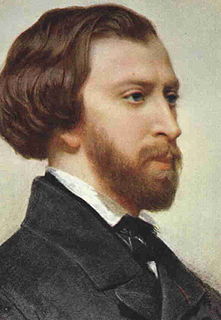A Quote by Edith Sitwell
Isn't it curious how one has only to open a book of verse to realise immediately that it was written by a very fine poet, or else that it was written by someone who is not a poet at all. In the case of the former, the lines, the images, though they are inherent in each other, leap up and give one this shock of delight. In the case of the latter, they lie flat on the page, never having lived.
Related Quotes
I find myself absolutely fulfilled when I have written a poem, when I'm writing one. Having written one, then you fall away very rapidly from having been a poet to becoming a sort of poet in rest, which isn't the same thing at all. But I think the actual experience of writing a poem is a magnificent one.
What is the cause that one is hardened, and another readily moved to compunction? Listen! It springs from the will, in the latter case a good will, in the former an evil one. It springs also from the thoughts, in the former case evil thoughts, in the latter from the opposite; and similarly from actions, in the former case actions contrary to God, in the latter godly ones... it is by free choice of the will that every person either attains compunction and humility, or else becomes hard-hearted and proud.
I am not sure, once a poet has found out what has been written already, and how it was written - once, in short, he has learnt his trade - that he should bother with literature at all. Poetry is not like surgery, a technique that can be copied. Every operation the poet performs is unique, and need never be done again.
A writer, or at least a poet, is always being asked by people who should know better: “Whom do you write for?” The question is, of course, a silly one, but I can give it a silly answer. Occasionally I come across a book which I feel has been written especially for me and for me only. Like a jealous lover I don’t want anybody else to hear of it. To have a million such readers, unaware of each other’s existence, to be read with passion and never talked about, is the daydream, surely, of every author.
Once a poet always a poet, and even though I haven't written poems for a long time, I can nonetheless say that everything I've ever learned about writing lyrical fiction has been informed by three decades of writing in lines and stanzas. For me the real drama of fiction is almost always the drama of the language.
If a poet has any obligation toward society, it is to write well. Being in the minority, he has no other choice. Failing this duty, he sinks into oblivion. Society, on the other hand, has no obligation toward the poet. A majority by definition, society thinks of itself as having other options than reading verses, no matter how well written. Its failure to do so results in its sinking to that level of locution at which society falls easy prey to a demagogue or a tyrant. This is society's own equivalent of oblivion.





































